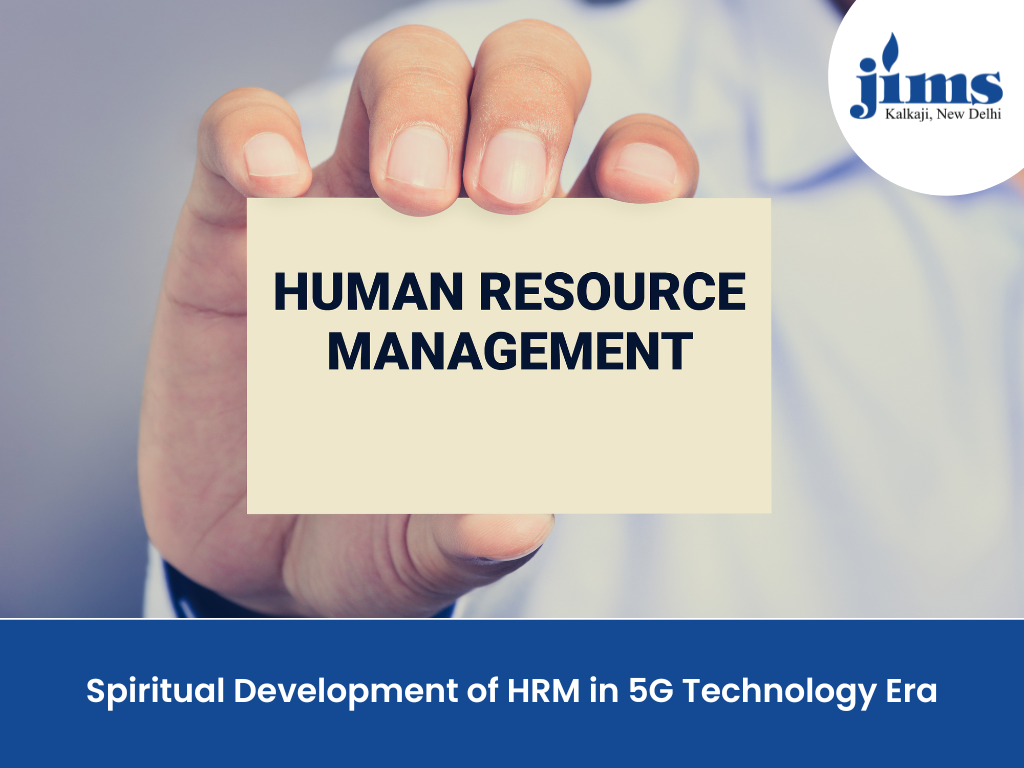
PREETI SINGH
ASSISTANT PROFESSOR
Significant change has been observed in organizations operating mechanism with advent of 5G era. The 5G era contributed to efficient communication channel, automation of systems and remote working. Technology has transformed business operations with culmination of digitalisation of processes. HRM faces new challenges and opportunities by digitalisation of business operations. In this context, spiritual development in Human Resource Management refers to “fostering inner values, ethical behaviour, purpose and mindfulness amongst the employees”.
1) Spiritual Development in HRM
Spiritual development in Human Resource Management (HRM) refers to “the process of integrating inner values, purpose, and a sense of connectedness into workplace practices to enhance employee well-being, organizational culture, and ethical behaviour”. It is not religious, but rather focuses on universal human experiences such as:
- Finding meaning and purpose in work
- Building trust, empathy, and compassion
- Fostering a sense of belonging and connectedness
- Encouraging self-awareness and inner growth
- Supporting ethical decision-making and moral integrity
- Key Elements of Spiritual Development in HRM
|
Examples of Spiritual Development in HRM Practice :
- Offering mindfulness or meditation sessions
- Incorporating purpose-driven leadership models
- Creating spaces for reflection, gratitude, and storytelling
Spiritual development in HRM focuses on:
- Self-awareness: Helping employees connect with their inner purpose and values.
- Ethical behaviour: Encouraging integrity and responsibility in decisions.
- Meaningful work: Aligning individual purpose with organizational goals.
- Connectedness: Promoting compassion, empathy, and collaboration
2) Spiritual Development in HRM in a 5G Era
The 5G era is characterized by ultra-fast connectivity, automation, artificial intelligence, and real-time data exchange. While this brings massive opportunities for efficiency and innovation, it also introduces new challenges like stress, burnout, and emotional disconnect. In this context, spiritual development in HRM becomes essential to maintain human-centric workplaces
Spiritual development in HRM refers to” fostering values, ethics, purpose, and inner well-being among employees. It’s not about religion but about helping individuals find meaning, alignment, and purpose in their work”
Key aspects include:
- Encouraging mindfulness and self-awareness
- Promoting empathy, integrity, and compassion
- Aligning personal values with organizational goals
- Supporting work-life balance and emotional resilience
Importance in the 5G Era
In the 5G-enabled world of high-speed automation and AI-driven decision-making, spiritual development becomes crucial to ensure that technology serves humanity, not the other way around. Reasons why it is important:
- Reduces Stress and Burnout: High-speed work environments can overwhelm employees. Spiritual practices like mindfulness reduce anxiety and improve mental health.
- Enhances Human Connection: Digital tools can isolate people. Spiritual HRM emphasizes empathy and interpersonal connection.
- Encourages Purpose-Driven Work: Employees seek more than just pay checks; they want meaningful work. Spiritual HRM nurtures this need.
- Boosts Innovation and Creativity: A calm, balanced mind is more likely to generate fresh ideas.
- Strengthens Ethical Decision-Making: In an age of automation and AI, maintaining ethical integrity is vital.
3) Practical Strategies for HRM
To integrate spiritual development in HRM, organizations can:
- Introduce mindfulness sessions, yoga, or meditation at the workplace
- Encourage value-based leadership and ethical practices
- Create a culture of gratitude, empathy, and respect
- Offer opportunities for self-reflection and inner growth
- Allow flexible work to support personal well-being
Examples of Spiritual Development of Human Resource Management In India are as under:
1) Tata group: Tata’s leadership culture is heavily influenced by the values of integrity, empathy, and humility, rooted in Indian spiritual philosophies. Tata companies like TCS and Tata Steel conduct yoga, meditation, and mindfulness sessions regularly to help employees reduce stress and improve focus. They promote “work with purpose” – aligning personal values with organizational goals. HRM practices include value-based training modules, covering topics like compassion, gratitude, and self-awareness. Tata Institute of Social Sciences (TISS), closely linked to the Tata Group, also promotes research in spiritual and ethical HRM.
2) Infosys: Spiritual HRM practices followed by founder Narayan Murthy emphasized ethical governance, humility, and respect—core Indian spiritual values. HR encourages personal reflection and mindfulness through internal wellness programs. Infosys Foundation supports value-based initiatives that reinforce the importance of dharma (duty) and seva (service) in employee life
3) Wipro: Spiritual HRM practices followed by Azim Premji are reflected in bringing simplicity, ethics, and spiritual humility into business. The HR team promotes empathy, servant leadership, and value-based hiring. Wipro conducts mindfulness sessions, yoga, and value alignment workshops for employees.
Conclusion
In the 5G era, organizations must evolve beyond just digital transformation. Integrating spiritual development into HRM is a proactive approach to ensuring that employees remain engaged, healthy, and purpose-driven in an increasingly fast-paced, tech-heavy environment. It’s not just about smarter workplaces—but also more soulful ones.

